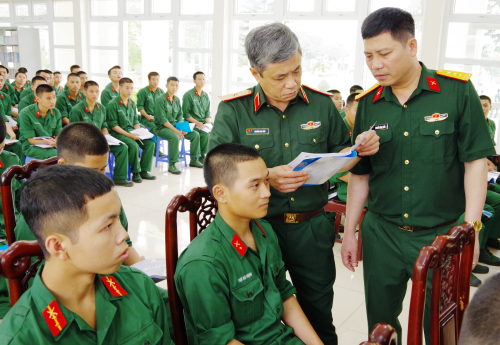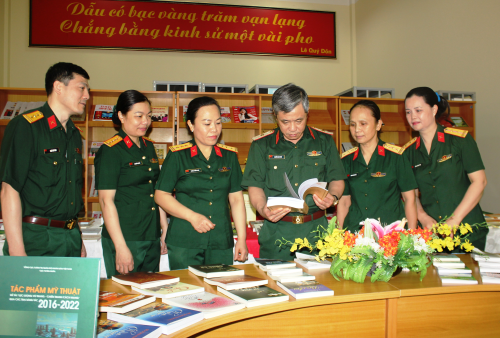Recognising the pivotal role of political education within the broader framework of ideological and cultural work, and its fundamental importance in fortifying the ideological battleground of the Party within the Military, the Military Region 3’s Party Committee and Command have diligently executed multiple comprehensive measures to rigorously enforce Directive No.2423-CT/QUTW, dated 9 November 2023, by the Standing Committee of the Central Military Commission, on “Innovating and enhancing the quality of political education in the new era”, aiming to contribute to building a streamlined, strong, and modernised armed forces within the Military Region.
Fully aware of the position, role, and significance of political education, the MR3’s Party Committee and Command, along with the leadership and command at all levels, have consistently led and directed the implementation of comprehensive measures, ensuring that political education remains a core, continuous theme in all activities of the Military Region, aligned closely with the political tasks and operations of the troops. The effectiveness of political education has significantly contributed to building a robust political foundation for the armed forces of the Military Region, which is essential for enhancing overall quality, combat strength, and meeting the demands and tasks of national defence in the new context.
 |
| Leader of the Political Department of MR3 checks political education at Division 395 |
Presently, the global and regional situation continues to evolve unpredictably and complexly; meanwhile, issues concerning non-traditional security, particularly cyber security, natural disasters, and pandemics, are becoming increasingly intricate. Domestically, the negative impacts of the market economy and social media adversely affect the ideology, sentiments, and lifestyles of the troops. Hostile and reactionary forces are intensifying their efforts to undermine all fields, with the Military being one of their key targets. The task of building and defending the Fatherland presents new, higher, and more demanding requirements in the context of MR3’s ongoing restructuring efforts as per the Politburo’s Resolution No.05-NQ/TW (the 13th Tenure) and the Central Military Party Commission’s Resolution No.230-NQ/QUTW, dated 2 April 2022, regarding the organisation of the Vietnam People’s Army in the period 2021 - 2030 and beyond, aiming to build a streamlined, strong, and efficient armed force within MR3.
In response to the current situation, MR3 has undertaken to thoroughly implement Directive No.2423-CT/QUTW, issued by the Standing Committee of the Central Military Commission (hereafter referred to as the Directive). MR3 has instructed its agencies and units to synchronously carry out leadership guidelines and measures to enhance political education. The foremost solution is to elevate the awareness and responsibility of party committees, political cadres, and commanders at all levels regarding political education. Effectively implementing this solution will enable leaders and commanders at all levels to correctly identify the position, role, and importance of political education, thus focusing on effective leadership and execution. Therefore, party committees, political cadres, and commanders at all levels must concentrate on studying, thoroughly understanding, and implementing the Directive, incorporating this task into their regular resolutions, party, and political work plans, and plans for building “exemplary and typical” units. Political departments at all levels, in coordination with relevant agencies, shall advise party committees, political officers, and commanders on organising the study, understanding, and implementation of the Directive, considering it one of the key annual tasks of party and political work. Local military agencies, based on guidance from higher political departments, must report to local party committees and relevant agencies before implementing the Directive within their units. To achieve effective results, branch and grassroots party committees should organise conferences for party members, while divisional and equivalent party committees should hold expanded party committee meetings. Company-level units and equivalents should organise collective soldier meetings, and mass organisations should use platoon and squad-level organisations to study and implement the Directive. This approach will not only strengthen leadership and direction at all levels but also ensure that 100% of cadres and soldiers deeply understand the position and importance of political education in building the political and spiritual factors within the Military and their units. Consequently, this will help clearly define attitudes and responsibilities, mobilising the comprehensive strength of organisations and individuals within the armed forces of the Military Region to successfully implement the Directive.
Heeding President Ho Chi Minh’s advice that “The Military’s strength lies in good education, sound policies, and strict discipline,” the Military Region requires that in implementing the Directive, all agencies and units must clearly establish that political education must be put under the direct leadership and guidance of party committees and organisations, with the management and supervision of political cadres and commanders. Based on the General Political Department’s Guidance No.3540/HD-CT, dated 15 December 2023, regarding the thorough implementation of Directive No.2423-CT/QUTW and the Political Education Regulations in the Vietnam People’s Army and Militia, all agencies and units must thoroughly understand the annual objectives, requirements, and plans for political education to adopt appropriate leadership guidelines and measures. Leadership and guidance must be comprehensive, yet focused on the critical aspects of political education, emphasising the roles and responsibilities of organisations and forces while optimising the use of unit cultural facilities and resources. In each phase and task, units must rigorously organise reviews to identify limitations, causes, and promptly devise corrective measures. Annually, the results of political education work will be a crucial criterion in assessing the performance of organisations and individual cadres, party members, and union members. Successfully implementing these contents will contribute to achieving substantive and sustainable improvements in the quality of political education.
 |
| Leader of MR3's Political Department visits book exhibition on Vietnam Book Day 2023 |
The contingent of political instructors plays a crucial role, determining the effectiveness of political education. Therefore, the Military Region demands that all agencies and units prioritise the development and enhancement of this contingent’s quality. The Military Region consistently ensures an adequate number of qualified political instructors, with a focus on units engaged in combat readiness training. Annually, party committees, commanders, and political departments at all levels lead and organise specialised training for political cadres and instructors to elevate the quality of political education within the units. Training is structured hierarchically, involving on-job training, senior-level training for junior levels, and activities such as competitions, teaching demonstrations, critiques, and experience sharing. The training content is comprehensive, covering qualities, capabilities, and work methods, with a focus on skills in political and ideological education, organisational and instructional abilities, pedagogy, and IT skills. Political cadres and instructors must exemplify the regulations on role-modelling at all times and in all areas, setting a standard in political education and learning for all cadres and soldiers to follow.
Innovating the content, programme, forms, and methods of political education is vital to meet the urgent demands of practice, aiming to achieve ever-higher quality and effectiveness in political education. Therefore, the Military Region directs agencies and units to closely align with practical realities, renewing political education in a fundamental, systematic, and unified manner, ensuring practicality and suitability for each audience and educational form. Content focuses on educating Marxism-Leninism, Ho Chi Minh’s thought, the Party’s viewpoints, policies and laws of the State, and the tasks of the Military, the Military Region, the units, and localities, along with new issues in legal, disciplinary, ethical, and lifestyle education for soldiers. Enhanced education and orientation are provided during sensitive periods, for new and significant tasks, challenging and dangerous missions, complex incidents, and issues of public concern. This approach aims to improve awareness, build motivation, responsibility, and self-awareness in task performance among cadres and soldiers. In terms of programmes, alongside the basic education programme, supplementary education should include content closely aligned with the practical duties and responsibilities of each group. For officers and professional soldiers, the focus is on enhancing self-study and research responsibility, correct self-orientation, and directly role-modelling in educating, managing, and guiding troops in task execution. For non-commissioned officers and soldiers, education includes life skills, communication skills, behaviour, and living skills, combined with political education and career orientation before discharge. For militia and reserve forces, education covers public mobilisation work, economic, political, cultural, social, defence, and security situations, thereby enhancing their knowledge and understanding. Regarding forms, innovation should be fundamental, modern, diverse, lively, engaging, and effective; relevant to the audience, situation, and tasks, and suitable to the facilities, equipment, and educational means of each unit. The focus is on promoting the active, self-aware, proactive, and creative participation of cadres and soldiers. In terms of methods, a close combination of traditional and modern teaching methods is required, integrating knowledge transmission with practical experience exchange, education with self-education, under the motto “Teach well, learn well, evaluate results realistically,” firmly opposing achievement-focused practices. Additionally, the application of science, technology, and digital transformation should be intensified to make political learning attractive, ensuring that learners grasp content thoroughly and apply it closely to their responsibilities. Close cooperation with localities and families is essential for managing and educating troops, especially in task performance. The integration of persuasive education with enhanced discipline management, building a regular, disciplined environment, and caring for the material and spiritual lives of troops is crucial to create a democratic, united atmosphere within the unit, ensuring the effectiveness of political education activities.
To continuously improve the quality and effectiveness of political education in accordance with Directive No.2423-CT/QUTW, contributing to building a politically strong, comprehensive, high combat strength armed forces within Military Region 3, capable of excellently completing all assigned tasks, it is imperative that party committees, commanders at all levels, and the party members in the armed forces of the Military Region uphold the spirit of “daring to think, daring to speak, daring to act, daring to take responsibility; daring to innovate, create, and face difficulties and challenges; and daring to act for the common good” in their execution.
Major General NGUYEN NAM TIEN, Commissar of Military Region 3